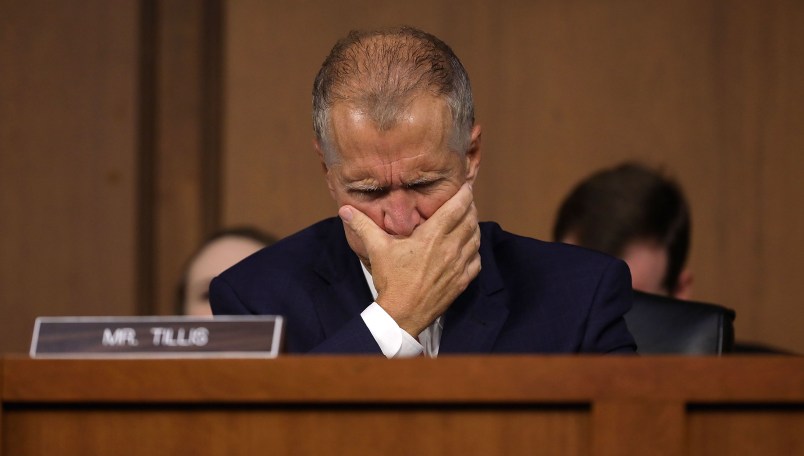Damned if you do, tweeted at if you don’t.
President Trump’s continued pressure on Republicans to stand with him on his emergency declaration and rejection of a GOP compromise has put those facing reelection in an impossible position — forcing them to choose between crossing their grudge-holding party leader or risking blowback from voters in their home states.
Trump has gone on the warpath against the Republicans who disagree with him on the emergency declaration, increasingly attacking them in recent days as he warns them not to cross him. That hit a new level Thursday morning, just hours before the expected Senate vote:
A vote for today’s resolution by Republican Senators is a vote for Nancy Pelosi, Crime, and the Open Border Democrats!
— Donald J. Trump (@realDonaldTrump) March 14, 2019
Trump will be in the Capitol for a bipartisan lunch with lawmakers and Ireland’s prime minister, and may keep twisting Republicans’ arms up until the hour of the vote.
His decision to keep escalating pressure on the issue comes as it becomes increasingly certain that enough Republicans will cross him to pass the Senate’s resolution of disapproval. After Trump rejected a possible face-saving compromise from Sen. Mike Lee (R-UT), Lee and Sens. Mitt Romney (R-UT) and Lamar Alexander (R-TN) announced they’d vote with Democrats on the resolution. That means at least seven Republicans will cross their president on the high-profile vote — a number that will likely climb on the final vote.
Trump’s decision to ratchet up the pressure on his party comes on a purely symbolic vote — he’s already promised to veto the resolution to undo his emergency declaration, and it’s tied up in the courts anyways. But it’s led to a lot of heartburn and squirming from many of the GOP incumbents whose combined fate will determine Senate control after 2020.
The most visibly uncomfortable of the bunch has been Sen. Thom Tillis (R-NC), who penned an op-ed weeks ago promising to vote with Democrats on a resolution of disapproval of Trump’s emergency declaration on the southern border, only to hem and haw in recent days about how he’ll actually vote. The first-term senator barely won election in 2014 in his slightly GOP-leaning state, and is will likely face a tough race in 2020.
Tillis has been a reliable vote for Trump up until now. But just by splitting on this one issue he’s facing fury from his base — with some home-state activists calling for a primary against him.
On the other side is Sen. Martha McSally (R-AZ), whose bear-hugging of Trump played a major role in her 2018 election loss to Sen. Kyrsten Sinema (D-AZ). McSally was later appointed to Arizona’s other Senate seat and faces reelection next fall. After assiduously avoiding saying anything about the issue for weeks, McSally announced she’d vote with Trump and against the border declaration on Wednesday.
That drew immediate rebukes from Democrats in the purple-trending state. Former astronaut Mark Kelly, who’s running against her, chided McSally for “voting to walk away and cede her constitutional authority to the president.” A local opinion columnist speculated that her decision would cost her any chance at winning next year.
Sen. Cory Gardner (R-CO), facing a tough race in a Democratic-leaning state, has been notably silent on this issue so far. But he’ll have to make a decision one way or the other on Thursday, with the vote expected sometime in the afternoon.
Other Republicans who may face competitive races that have stuck steadfast with Trump on the vote include Sens. David Perdue (R-GA) and Joni Ernst (R-IA).
Some other Republicans have decided to go the other route. Sen. Susan Collins (R-ME), a frequent Trump critic from a state he lost, came out early to say she’d vote with Democrats on the issue. She has more of an independent brand and less fear of a blowback from the base than some other 2020 Republicans, but still risks alienating conservatives in a rural state where Trump is popular with the GOP base.
No matter how they vote, Republicans are furious that Trump has put them in such an awkward position. And he hasn’t done them any favors in recent days.










